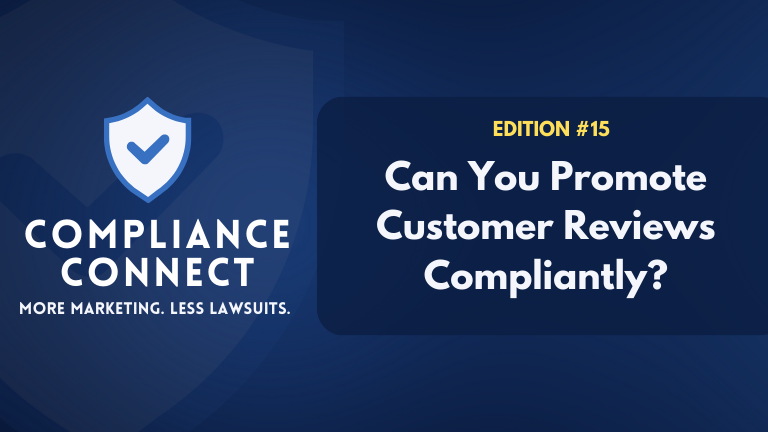Good morning! This is the fifteenth edition of the Compliance Connect newsletter.
The goal is simple: to keep you in the loop on what the FTC and other regulatory agencies are up to so that you can protect yourself.
These newsletters will land in your inbox twice a week – Mondays and Thursdays.
Remember: this is NOT legal advice, only information!
Here’s the rundown today…
- 💬 New Rule On Fake Reviews Takes Effect
- ⭐ Can You Do Anything To Promote Customer Reviews?
- 📅 Compliance Challenge Starts Next Week!
- 💼 New Settlement Imminent?
- 💻 Warning Signs For Crypto Companies
Compliance Digest: What You Should Read Today
New FTC Rule On Fake Online Reviews Is In Effect
Back in August, the FTC announced new rules designed to crack down on fake reviews and testimonials.
On October 21, they went into effect and will be enforced.
Until now, the FTC has gone after companies engaging in these practices on a case by case basis.
With these new rules, they want to make it even EASIER to go after companies who engage in these practices.
They also want to get ahead of AI-generated fake reviews.
If you are a business owner or marketer, it’s ESSENTIAL to know what these new rules are.
Later in this newsletter we’ll discuss both what you can and can’t do under these new rules.
FTC And H&R Block Appear Ready To Settle
In February, the FTC took action against the tax preparation company H&R Block for unfair data deletion and deceptive marketing.
Similar to the TurboTax case, H&R Block was accused of promoting its tax filing products as “free,” but many consumers were not eligible for the free service, as it was limited to “simple returns.”
In addition, when customers attempted to downgrade to more affordable tax filing products, H&R Block required them to contact customer service, which would result in all their tax data being deleted, forcing them to start over.
The FTC alleges that these practices harmed consumers by pressuring them to overpay for services and wasting their time.
The FTC decided to handle this as an administrative complaint. On Monday, both parties agreed to withdraw from adjudication. A settlement will probably follow.

Can You Do Anything To Promote Customer Reviews?
As I mentioned in the Compliance Digest, the FTC’s new rules around testimonials and reviews are in effect.
The purpose of these rules are to go after companies that use fake reviews and testimonials in their marketing.
Even though the rule covers a lot of ground, there are many things that you are still allowed to do to encourage customer reviews and deal with unfair reviews…
What You CAN’T Do
Let’s start with a reminder of the specific practices that are banned…
#1 – Fake or False Consumer Reviews
You can’t create, sell, buy, or spread fake reviews or testimonials, including AI-generated ones, or those that misrepresent someone’s experience with a business or its products.
#2 – Buying Positive or Negative Reviews
You can’t provide compensation or incentives in exchange for consumer reviews that express a particular positive or negative sentiment.
#3 – Insider Reviews and Consumer Testimonials
Company insiders, like officers or managers, can’t provide reviews or testimonials without clearly disclosing their connection to the business. You also can’t get immediate relatives to leave reviews without proper disclosure.
#4 – Company-Controlled Review Websites
You can’t pretend that a website you control offers independent reviews or opinions about your products or services.
#5 – Review Suppression
You can’t suppress negative reviews through unfounded legal threats, intimidation, or misrepresentations about the completeness of reviews on your website.
#6 – Fake Social Media Indicators
You can’t purchase fake social media indicators, like followers or views, to make your brand look more popular than it actually is.
What You CAN Do
With this rule in place, there is still A LOT you can do to generate more reviews and address unfair reviews.
First, you can ask for reviews or celebrity testimonials and even offer rewards for them.
However, you cannot require people to write only positive reviews to get the reward.
Second, employees or family members can write reviews on their own, but the business owner cannot ask them to do it unless their relationship is disclosed.
Third, you can remove reviews for these reasons:
- The review seems fake
- The review has nothing to do with the business
- The review shares secret or private business information
- The review is rude, uses bad language, or is inappropriate
- The review includes personal information about someone else
- The review is racist, sexist, or otherwise discriminatory
- The review is clearly wrong or misleading
These rules help keep things fair while letting businesses protect themselves from unfair reviews.
For more details, check out this article from the National Federation Of Independent Businesses, which also discusses some of the changes they fought for with the final rule.
Did You Know…
The FTC was created on September 26, 1914 with a mission to protect customers and promote fair competition. Its predecessor, the Bureau of Corporations, was created by Teddy Roosevelt in 1903.

Quick Compliance Tip: Crypto
With more people getting interested in cryptocurrencies, many companies are creating courses and coaching programs, or even selling the crypto itself and the hardware for it.
This has become a big, billion-dollar industry. The problem is, some companies tell people they will make certain amounts of money from crypto (just like stocks or businesses).
But… if those promises aren’t true, the FTC will step in.
In 2016, the FTC stopped two companies, Bitcoin Funding Team and My7Network, because they were accused of lying to people about how much money they could make.
The companies said people could “earn an unlimited amount of money” using their crypto referral programs, but most people didn’t make much money.
In fact, most of them LOST money. The FTC said the companies were making promises without proof.
These are the same kinds of unsubstantiated claims we talk about with other industries!
In the end, the companies had to pay over $450,000 as part of the settlement.
Since cryptocurrencies are very risky, regulators like the FTC and SEC (Securities and Exchange Commission) are keeping a close eye on them.
We can expect MORE action from them as crypto becomes more popular.
For example, in September the FTC published a report about Bitcoin ATMs.
They don’t publish these reports for fun – there are probably multiple investigations already in the works!
If you sell crypto, run a crypto exchange, teach others about crypto, or sell any tools for crypto, you’re in a space with a lot of rules and scrutiny.
